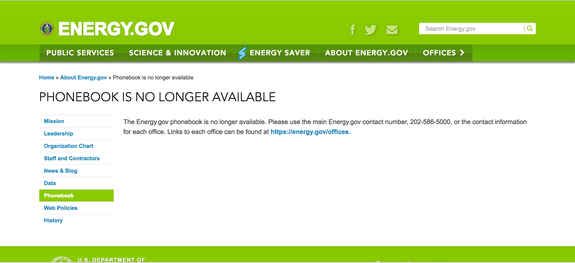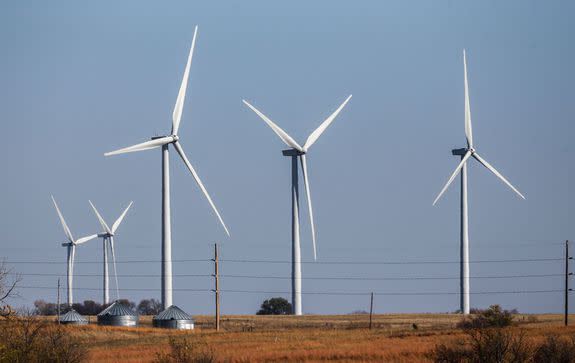It just got a whole lot harder for you to contact Energy Department employees

The Department of Energy has taken down its public-facing employee directory, making it far more difficult for journalists and members of the public to locate email addresses and phone numbers for agency personnel.
The move, which was announced to agency contractors on Wednesday and implemented Thursday morning, was confirmed in an internal email shared with Mashable.
Making federal scientists and policy makers harder to contact isn’t a trivial matter. These kinds of moves toward opacity wall off employees from the outside world and make it more likely that they won’t experience public pressure related to their taxpayer-funded work.
SEE ALSO: Rick Perry regrets calling for abolishment of Energy Department
It also makes it easier for public relations officers to assume more control over access to interview subjects, since journalists unfamiliar with agency sources will need to contact the central press office to make headway on a story.
The phonebook was functioning early Thursday morning but went down around 10:15 a.m. ET.
This is how the page reads now:

Image: energy.gov
Instead of finding the Energy Department phonebook online on Thursday, visitors to the department website now are directed to a central phone number (which is 202-586-5000) and are told to contact a specific office via a web directory.
The directory allowed any user to search for department employees by name and retrieve their basic contact information and office division, which was a help for journalists, civil society watchdog groups and many others seeking to penetrate the often opaque federal bureaucracy.
Until this morning, you could look up Department of Energy (DOE) employees by name to find their office phone number and email addresses. Considering the fact that the department is a maze of more than 10,000 employees and contractors located around the world, that phonebook is more than convenient — it’s essential.
Other federal agencies, including the National Oceanic and Atmospheric Administration and NASA, still have intact public phonebooks, as they did throughout the Obama administration.
The Energy Department says it took down the phonebook because of internal complaints from agency personnel who didn't want their information shared anymore.
"The Office of Public Affairs had received complaints from the workforce regarding the release of their direct contact information and the disruption to their operations as a result of outside personnel reaching out directly vice working through the appropriate channels," said Shelley Laver, an agency spokeswoman, in an email.
"The public is still able to communicate with the department through various channels," she said. The agency's database did not provide a feasible way to allow individual employees to opt out of being listed while also maintaining the public directory, she said.
The internal email sent to an agency contractor did not provide a reason why the public phonebook was removed. Given that the phonebook has been online for years, it's removal now strikes some as suspicious.
Energy Department employees, contractors and watchdog groups have been on alert for changes at the department that would limit transparency and would infringe upon the agency's broad portfolio of climate science research. Maintaining the scientific integrity and independence of the agency's scientific work has been a particular concern in light of the Trump administration's denial of mainstream climate science findings.
"Taking down the phonebook doesn’t make sense," said Michael Halpern, the deputy director of the center for democracy at the Union of Concerned Scientists, an environmental advocacy group. "This centralizes communication and makes it more difficult to get in touch with individual DOE employees without going through an approval process first," he said, using the acronym for the agency.
Halpern said the removal of the phonebook, if it is permanent, "could limit direct access to DOE scientists." By routing callers through main offices, he said, "It has the potential to add a political filter to how DOE communicates science."
Prior to stepping down at the end of former president Barack Obama's second term, then-secretary Ernest Moniz signed an agency-wide scientific integrity policy that would ostensibly protect the organization's research from political interference.
"The DOE scientific integrity policy states that employees don’t need to ask for permission before publicly sharing scientific information with those who ask," Halpern said. "DOE should be doing all it can to make scientific experts more accessible to the public, and this goes in the opposite direction."
EPA scientists have already been forced to violate their integrity policy when they were told not to speak to the press or share research results with the public during the presidential transition.

Image: Nati Harnik/AP/REX/Shutterstock
Under Obama, the Energy Department became a leading source of venture capital for clean energy firms, in addition to funding cutting edge climate science and energy research at its network of national labs.
The Trump administration made waves during the transition when it asked the department for the names of employees who had worked on climate programs and participated in international climate negotiations, suggesting a coming purge of staff involve in climate programs.
The Trump transition team then backed off from that questionnaire, attributing it to a "rogue" staff member. The transition team also hinted that the department is destined for an across the board 10 percent budget cut under the new administration.
President Donald Trump's nominee for Energy Secretary, former Texas governor Rick Perry, has said he would work to protect scientists at the department and is still awaiting Senate confirmation. In the past, Perry has denied the existence of human-caused climate change and advocated for the elimination of the agency entirely, though he softened that stance at the opening of his confirmation hearing.
"I have learned a great deal about the important work being done every day by the outstanding men and women of the Department of Energy," Perry said.
"My past statements made over five years ago about abolishing the Department of Energy do not reflect my current thinking," he said.
The disabling of the public Energy Department phonebook is similar to what the Trump administration did to the White House public contact number, when it instead asked for comments via social media or a web form.
In both cases, the ease of public access to key parts of the federal government has been limited. The White House is now essentially walled off from comment by anyone without an internet connection.
If you are a federal employee, scientist or citizen scientist who sees climate science and policy shifts at federal agencies and wishes to alert the media, we want to hear from you. Please send an email from your personal email account to science@mashable.com.
You can also contact science editor Andrew Freedman via the secure messaging app Signal, with detailed information in his Twitter bio.
